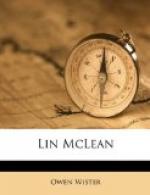We left him in his triumph among his glass and mercury. “Gee whiz!” said the Governor. “I guess we’d better go and tell Hilbrun it’s no use.”
We went, and Hilbrun smiled with a certain compassion for the antiquated scientist. “That’s what they all say,” he said. “I’ll do my talking to-morrow.”
“If any of you gentlemen, or your friends,” said Assistant Lusk, stepping up, “feel like doing a little business on this, I am ready to accommodate you.”
“What do yu’ want this evenin’?” said Lin McLean, promptly.
“Five to one,” said Lusk.
“Go yu’ in twenties,” said the impetuous puncher; and I now perceived this was to be a sporting event. Lin had his wad of bills out—or what of it still survived his bride’s shopping. “Will you hold stakes, doctor?” he said to the Governor.
But that official looked at the clear sky, and thought he would do five to one in twenties himself. Lusk accommodated him, and then Ogden, and then me. None of us could very well be stake-holder, but we registered our bets, and promised to procure an uninterested man by eight next morning. I have seldom had so much trouble, and I never saw such a universal search for ready money. Every man we asked to hold stakes instantly whipped out his own pocketbook, went in search of Lusk, and disqualified himself. It was Jode helped us out. He would not bet, but was anxious to serve, and thus punish the bragging Lusk.
Sunday was, as usual, chronically fine, with no cloud or breeze anywhere, and by the time the church-bells were ringing, ten to one was freely offered. The biscuit-shooter went to church with her friends, so she might wear her fine clothes in a worthy place, while her furloughed husband rushed about Cheyenne, entirely his own old self again, his wad of money staked and in Jode’s keeping. Many citizens bitterly lamented their lack of ready money. But it was a good thing for these people that it was Sunday, and the banks closed.
The church-bells ceased; the congregations sat inside, but outside the hot town showed no Sunday emptiness or quiet. The metal tube, the possible smell, Jode’s sustained and haughty indignation, the extraordinary assurance of Lusk, all this had ended by turning every one restless and eccentric. A citizen came down the street with an umbrella. In a moment the by-standers had reduced it to a sordid tangle of ribs. Old Judge Burrage attempted to address us at the corner about the vast progress of science. The postmaster pinned a card on his back with the well-known legend, “I am somewhat of a liar myself.” And all the while the sun shone high and hot, while Jode grew quieter and colder under the certainty of victory. It was after twelve o’clock when the people came from church, and no change or sign was to be seen. Jode told us, with a chill smile, that he had visited his instruments and found no new indications. Fifteen minutes after that the sky was brown. Sudden, padded, dropsical clouds were born in the blue above our heads. They blackened, and a smart shower, the first in two months, wet us all, and ceased. The sun blazed out, and the sky came blue again, like those rapid, unconvincing weather changes of the drama.




